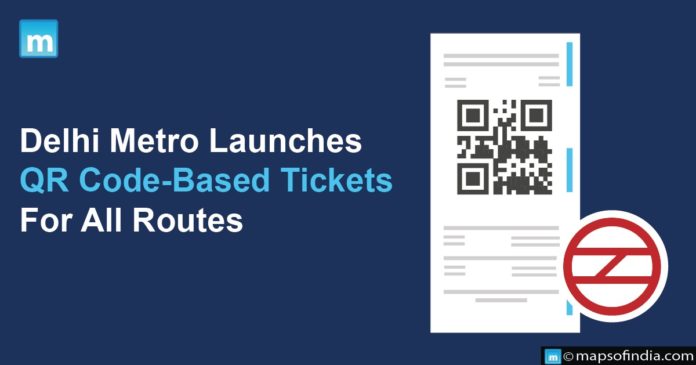Delhi Metro Rail Corporation (DMRC) has taken a significant step towards enhancing the convenience and efficiency of metro travel by introducing a QR code-based paper ticket system on all of its routes. This new system, implemented on May 8, aims to streamline passengers’ entry and exit process, reducing wait times and providing a hassle-free experience.
DMRC upgraded its Automatic Fare Collection (AFC) gates and customer care centres throughout all metro stations to enable the QR code-based ticket system. Two gates at each metro station have been modified as part of this initial rollout to make it easier to enter and exit using paper tickets with QR codes. With this change, travellers can quickly pass through the AFC gates without needing physical tokens or smart cards by scanning their QR codes.
DMRC has introduced QR code-based paper tickets for travel on all its lines from today i.e., 8th May 2023. With the introduction of this facility, commuters will now be able to use the QR Code based paper tickets apart from the tokens.
— Delhi Metro Rail Corporation I कृपया मास्क पहनें😷 (@OfficialDMRC) May 8, 2023
By the end of May, DMRC also intends to roll out mobile-based QR tickets, significantly boosting the speed and ease of metro travel. Thanks to this discovery, passengers can generate QR codes for ticket validation using their cellphones, which completely replaces the requirement for actual paper tickets.
How does the “QR Code” ticketing system work for hassle-free metro travel?
- Under the new QR code system, passengers can only enter the metro system from the station where the QR code-based ticket has been issued. This restriction ensures increased security and prevents ticket fraud by prohibiting entry from any other station.
- The incident fare mode will be used at the AFC gates to appropriately modify the QR code-based tickets if the DMRC’s revenue services experience a problem. This guarantees that travellers can continue their journey without interruption and are not inconvenienced by technical problems.
- Users can enter the metro system within 60 minutes of receiving their tickets with QR codes. However, if you arrive more than 60 minutes late, you won’t be admitted and won’t be a refund. Currently, only trips between the source station and the destination station are covered by tickets with QR codes.
- The ticket with a QR code will not be accepted if a traveller decides to end their trip in the middle of it. In certain situations, the customer service representative will provide the traveller with a free exit token to leave the metro system without paying additional fees.
- The AFC gates won’t open if a user of the QR Code-based ticket unintentionally departs from their intended station. After deducting the fare difference, the customer service representative will give out an exit token.
- Passengers must present the mobile image or a copy of the QR Code-based ticket for validation. Failure to do so will result in being considered “without ticket” and charged accordingly.
The DMRC intends to update the vending machines to issue tickets with QR codes to improve the ticketing procedure further. This improvement is anticipated to be finished by the end of June, along with a comprehensive upgrade of all AFC gates. The DMRC plans to gradually phase out the token system by adopting this effective and paperless paper ticket system based on QR codes, giving metro users a more smooth and more contemporary experience.





